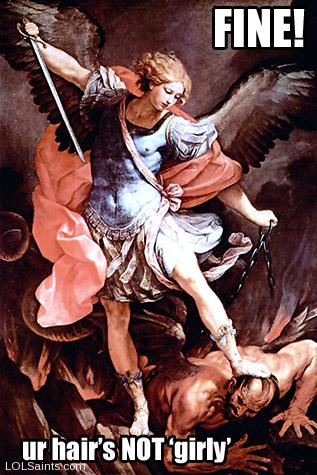
I would be remiss if I did not wish my fellow contributors and readers a blessed Feast of St. Michael the Archangel. As a fighting angel, Michael is particularly well-suited to represent what we stand for here at What's Wrong With the World. (Please excuse the light humor in the above picture. I've always liked it.)
And there was war in heaven: Michael and his angels fought against the dragon; and the dragon fought and his angels, and prevailed not; neither was their place found any more in heaven. And the great dragon was cast out, that old serpent, called the Devil, and Satan, which deceiveth the whole world: he was cast out into the earth, and his angels were cast out with him. And I heard a loud voice saying in heaven, "Now is come salvation, and strength, and the kingdom of our God, and the power of his Christ: for the accuser of our brethren is cast down, which accused them before our God day and night. And they overcame him by the blood of the Lamb, and by the word of their testimony; and they loved not their lives unto the death. Therefore rejoice, ye heavens, and ye that dwell in them. Woe to the inhabiters of the earth and of the sea! For the devil is come down unto you, having great wrath, because he knoweth that he hath but a short time."
Collect for the Feast of St. Michael and All Angels
O everlasting God, who has ordained and constituted the services of Angels and men in a wonderful order; Mercifully grant that, as thy holy Angels always do thee service in heaven, so, by thy appointment, they may succour and defend us on earth; through Jesus Christ our Lord. Amen.

Comments (6)
Thought you might find these Catholic reflections interesting, based on Saint Augustine's thoughts on the subject:
http://taylormarshall.com/2015/09/video-the-fall-of-lucifer-and-saint-michaels-victory.html
Posted by Jeffrey S. | September 29, 2015 4:57 PM
I admit that the question of where the angels fall in the creation in Genesis 1 has never bothered me. After all, it says, "God created the heavens and the earth." It doesn't say that this is about how God created *absolutely all* finite things, including angels. I've always assumed that the angels were created before the beginning of Genesis 1. Augustine's allegorical interpretation doesn't commend itself. I'm quite certain it isn't how Moses or anyone in the human audience would have understood "light" and "darkness," nor is there reason elsewhere in Scripture for taking that to be some kind of extra or secondary meaning.
Posted by Lydia | September 29, 2015 6:56 PM
Fair enough. Maybe it is implausible. It certainly isn't how I read the passage, until I read St. Augustine.
But I ask you, how did you imagine the light happening - days before the sun, moon, and stars? If the "light" is taken to be a literal, visual light, it is a light without any SOURCE. Which God can do, of course, but to what purpose, and how would He "separate" light from darkness, when there is no source for the light to begin with? I don't think it is quite fair to say that it has NOTHING to recommend it. Maybe it is fair to say this reading is implausible, but there is nothing actually detrimental to the faith to read this as the allegorical level of meaning intended by Moses.
Posted by Tony | September 29, 2015 10:13 PM
While this is not popular in some circles, I have to say that it actually agrees with what the Big Bang postulates in that Energy (and light) already existed before any stars or the sun... so no reason for it to refer to the fall of satan. The other option is of course that God Himself were literally the source of the visual light (as it is prophesied to be in the new heaven and earth). But I am hesitant to make any final pronouncement on something which Scripture does not explicitly explain.
Posted by Chavoux | October 1, 2015 1:17 PM
Chavoux, I have thought the same thing about the Big Bang. Suppose, for a moment, that God gave Moses a vision of creation as of the moment of the Big Bang. How would he describe that first moment? Light so intense as to be beyond light, and (for the first billionths of a second or whatever the period was) no other anything. Then, as the expansion continued and cooling started, and the broth of the first moments started to devolve with the introduction of particulate stuff, you might call that a "separation" of the light from the dark.
One cool thing about this is that it also leaves Augustine's interpretation completely intact: if Augustine's treatment is of the allegorical sense of Scripture (rather than of the literal), then Moses' description could both intend the literal Big Bang AND allegorically the creation of angels.
But I don't insist on it.
Posted by Tony | October 1, 2015 1:33 PM
Only problem is that the big bang theory or model does not, indeed can not describe the creation of the universe. No physical theory can do so since physics presupposes space time and matter already in place. Relatedly empirical observations commence post-creation and the moment of creation can never be an empirical matter. Again one believe in the big bang purely on the authority of physics and the same physics is naturally trying to explain the causes of the big bang in physical terms. Thus keep bible apart from fickle physics
Posted by bedarz iliàci | October 2, 2015 12:59 AM